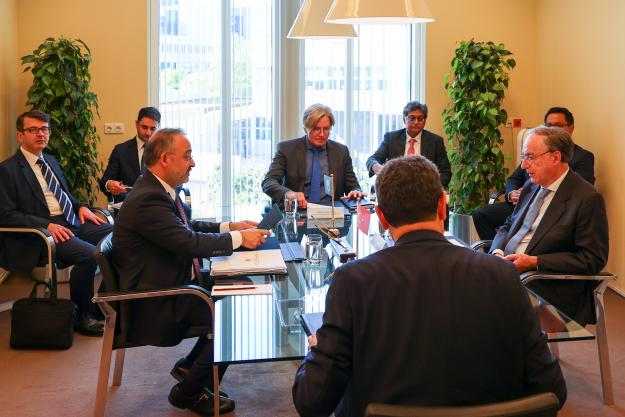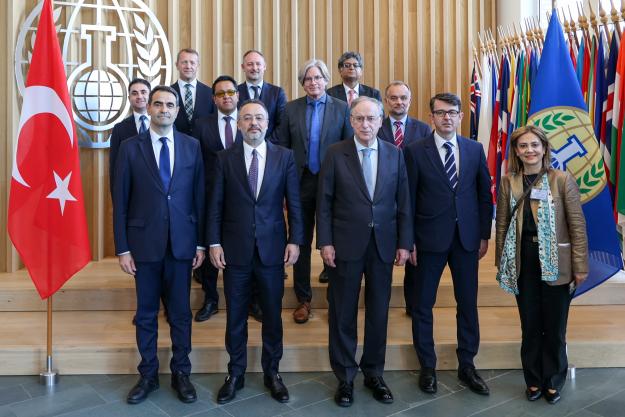The Director-General of the Organisation for the Prohibition of Chemical Weapons (OPCW), Ambassador Fernando Arias, had a meeting with Türkiye's Deputy Foreign Minister, H.E. Dr Nuh Yilmaz, on 30 April 2025 at the OPCW's Headquarters in The Hague.
During the meeting, the Deputy Foreign Minister and the Director-General discussed a range of issues concerning the implementation of the Chemical Weapons Convention (CWC). Director-General Arias stated, "2025 is the centenary of the 1925 Geneva Protocol prohibiting the use of chemical and biological weapons. One week ago, in Ieper, Belgium, the OPCW joined a wreath-laying to mark 110 years since the first large-scale use of chemical weapons. These anniversaries solemnly remind us to strengthen our collective efforts in upholding the global norm against chemical weapons."
Deputy Foreign Minister Yılmaz stated that "Türkiye's geo-strategic position imposes us a critical role in regional and international security in a wide geography. We continue our close cooperation with the OPCW." The Deputy Foreign Minister also thanked the Director-General for his work.
The two senior officials had an in-depth discussion on the situation in Syria. Director-General Arias briefed the Deputy Foreign Minister on the OPCW's ongoing efforts to resolve the outstanding issues related to Syria's chemical weapons dossier, highlighting his visit to Syria in February and the Syrian caretaker Foreign Minister's visit to the OPCW Headquarters in March of this year.

H.E. Dr Nuh Yilmaz, Deputy Minister of Foreign Affairs of the Republic of Türkiye, and Ambassador Fernando Arias, OPCW Director-General, and their delegations during a visit to OPCW Headquarters in The Hague, the Netherlands on 30 April 2025.
The Director-General provided an update on the ongoing engagement between the OPCW Technical Secretariat and the Syrian interim authorities. He noted, "The Secretariat deployed teams to Syria in March and April 2025. During the deployment, the Secretariat's team visited five locations in the vicinity of Damascus, of which three were previously declared and two were never declared to the OPCW. The Secretariat's team underscored the importance of securing the related sites, materials, persons of interest and information. Discussions on establishing an adaptive and sustained presence of the OPCW Mission in the Syrian Arab Republic aimed at closing the dossier at an early date are underway. The Syrian interim authorities have extended full support to the relevant activities of the Secretariat."
Director-General Arias also outlined the OPCW's activities related to Ukraine, including the findings of the Technical Assistance Visit reports issued in November last year and February this year. He reiterated his deep concern over the reports' findings and emphasised the responsibility of all States Parties to uphold the norm against chemical weapons. In this context, he reaffirmed the Technical Secretariat's preparedness and dedication to continue supporting all Member States through the provision of independent expertise.

H.E. Dr Nuh Yilmaz, Deputy Minister of Foreign Affairs of the Republic of Türkiye (middle left), and Ambassador Fernando Arias, OPCW Director-General (middle right), with their delegations during a visit to OPCW Headquarters in The Hague, the Netherlands, on 30 April 2025.
Background
Türkiye has been an active member of the OPCW since 1997. Since August 2024, Türkiye's Chemical Warfare Agents Diagnosis and Verification Laboratory has been recognised as an OPCW designated laboratory for environmental sample analysis. Türkiye is represented in the Scientific Advisory Board of the OPCW by Professor Sermet Sezigen.
As the implementing body for the Chemical Weapons Convention, the OPCW, with its 193 Member States, oversees the global endeavour to permanently eliminate chemical weapons. Since the Convention's entry into force in 1997, it is the most successful disarmament treaty eliminating an entire class of weapons of mass destruction.
In 2023, the OPCW verified that all chemical weapons stockpiles declared by the 193 States Parties to the Chemical Weapons Convention since 1997 - totalling 72,304 metric tonnes of chemical agents - have been irreversibly destroyed under the OPCW's strict verification regime.
For its extensive efforts in eliminating chemical weapons, the OPCW received the 2013 Nobel Peace Prize.






